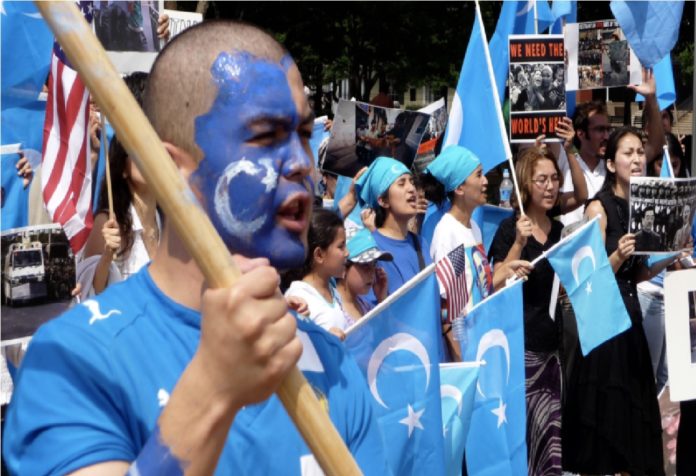(Column by Ghulam Osman, President of East Turkistan Government-in-Exile)
The engine that drives China’s oppression is fear. This may sound confusing to some people, but if we analyze many of the incidents that took place after the communist invasion of East Turkistan in 1949, we can understand what it means.
After 270 years, the Han Chinese overthrew the Manchus through the Xinhai Revolution. Due to their hatred of the Manchus, the Han Chinese made sure to silence the Manchus to the point where they did not even dare to say, “I’m Manchu”. With strategic advocacy of Yuan Shikai, which promoted Chinese migration into the traditional territory of Manchuria (three provinces of modern-day north-east China), Han Chinese rapidly reversed the demographics of Manchuria. Manchus did not even get the “autonomy” status that was bestowed upon 5 other major nationalities. In fact, Han Chinese resolutely carried out an assimilation policy, decimating the population of Manchus into insignificance. It even came to a point where the Manchus started to hide their identity.
South Mongolia or “Inner Mongolia”, was given the status of autonomy by Chinese regime during their rule. However, in Inner Mongolia, the population of Mongols was reduced to comprise only 5% of the total population through mass migration of Chinese nationals. The Chinese regime experimented all ethnic elimination policies there—Chinese names were imposed upon Mongols and Mongol language was forced to be gradually extinct. The Mongols, who became a minority on their own land, struggled to keep their language alive in 2000s and are now fighting desperately for its survival.
However, China’s strategies in East Turkistan have always failed as it could not completely defeat Uyghur’s sense of superiority and their ancestor’s heroic spirits. This was a very frightening factor for the Chinese—whenever a national resistance movement broke out, the Han Chinese in East Turkistan would start to flee to their homes in inner China. Chinese migrants, whom the Chinese regime planned to use to wipe out Uyghurs, saw East Turkistan as a temporary place to make money and then to go back to their homes, never to settle down forever. Thus, the Chinese regime’s complete colonization plan was indefinitely postponed. To encourage them to take roots in East Turkistan, Chinese nationals were given lots of exemptions and preferential benefits. However, this failed to convince them that this land was theirs. Even if there was the slightest friction between Uyghurs and Han Chinese, the latter would, at least, send their family members back to China.
Normally, Chinese are quite cowardly, and this cowardice as national characteristics originated in their ancestors who built the Great Wall to defend themselves from the invaders in the north. Even though Chinese are the owners of the government and a master people, they have always been seen by Uyghurs as thieves, barbarians, and gatecrashers. There are a lot of standardized metaphors Uyghurs have used to describe their disdain for Chinese. Uyghurs usually describe filthiness, immorality, untidiness, lack of mannerism like being “a Chinese.” Therefore, despite successfully invading Uyghurs land physically, Han Chinese never completely succeeded in invading their collective soul. Every time this failure was revealed painfully, Han Chinese, who perceive themselves as the center of the world and have the innate tendency for extreme narcissism, felt humiliated. Despite being supported by a series of governmental policies and indoctrinated into becoming Chinese nationalists in a new century, they feared Uyghurs in East Turkistan, unable to carry themselves as the master people. In this sense, they took away the dignity of their government. In the 1950s, Han Chinese settlers in East Turkistan were afraid to come outside after sunset. During daytime, they could not walk Uyghur neighborhoods alone. If there was a fight between these two peoples, one Uyghur could scare ten Chinese away. The Chinese government, therefore, sought to destroy this superiority feeling by escalating their gradual destruction of Uyghurs.
Shortly after China invaded Vietnam in 1979, the former Soviet Union set up a plot to threaten the western part of China. They formed a National Rescue Army with youths from neighboring Central Asian countries to alleviate Chinese pressure on Vietnam. Congruently, the Chinese government was nervous and mobilized its people to prepare for a possible war and even educated the people on this army. It was said that these youths were the descendants of those who escaped to Central Asian countries and the general commander in chief of this army was Zunun Teyip. The weapons of this army were quite modern and advanced, and the speed of its assault was too fast to stop…
Upon hearing this news, the Han Chinese in East Turkistan started to sell their furniture in a hurry at cheap prices and fled to inner China en masse. In Urumqi, some Uyghurs bought train tickets in bulk and sold them back to Chinese escapees at higher prices, even brazen enough to tell Chinese to their face that they are invaders and invaders must leave. In 1997, following the armed suppression of protests on the streets of Ghulja staged by bare-handed Uyghurs, Chinese who were scared, again fled East Turkistan for inner China en masse. The Chinese government feeling indignation was forced to announce new laws on a temporary basis to punish escapees with one to three years in jail. The government also erected blockades maintained by the army and marked checkpoints, turning back Han Chinese escapees.
This situation demonstrates that Chinese policies, which were successful in Manchuria and Inner Mongolia, were not that successful in East Turkistan, causing the Chinese government to be furious and providing a dilemma for them.
In the 2000s, former Chairman Jiang Zemin visited East Turkistan. Local Han Chinese officials complained about the unyielding spirit of Uyghurs and their tendency for unrests. Jiang was displeased and scolded them irately: “China has established its new government for over half a century, and it’s shameful to still complain about the ‘separatists.’ We are the Zhonghua minzu (aka the Chinese nation), who have continuously melted and assimilated countless other ethnic minorities in the course of our history. Now is it not rather humiliating to complain about not being able to resolve the issue of these small Uyghurs? What is holding you back? If you need to get rid of one of them, then get rid of 10 more together. Who is banning you from doing so?” Before leaving, he instructed them to prepare a concrete plan for the elimination of Uyghurs at any cost and would be taken care of by the central government. As such, what is happening today was drafted back then.
One of the plans was to relocate Uyghurs into Han Chinese world—to swamp them in the alien world—under the guise of providing them with employment opportunities. Uyghurs did not lose their unyielding spirit—they did not see Han Chinese as their master or boss and refused to fear them against their expectations. Instead, they held their head high in pride, despite being a Uyghur in a sea of Han Chinese in inner China, being fearless, continuing the lifestyle they had practiced for centuries. During the clash in Shaoguan, Guangdong, Chinese authorities tried to make it look like an incident caused by Uyghur workers who flirted with local Chinese women to destroy the dignity of local workers and others in a place surrounded by Han Chinese. Even when their situation was like a small boat in a big ocean, they dared to “flirt” with Chinese females. This unyielding spirit angered the Chinese government, not the Chinese people. This clash happened between Uyghur workers and plain-clothed Chinese policemen. If it angered the masses of Chinese people, they could have consisted of people of different ages and genders as would be a normal case.
In the aftermath of the Urumqi Massacre (July 5, 2009), some Chinese took to the streets to express their wrath towards the long lasting “suppression & tyranny” of the Uyghurs. Right after what happened in Shaoguan (on June 26, 2009), to the disappointment of the Chinese government, some Chinese in East Turkistan started to flee again as usual. They were disappointed with the fact they failed to establish the confidence of a master nation in the hearts of the Chinese and hence was forced to create a fake mass. As a result, the soldiers and policemen were dressed like ordinary people, under guidance of the Chinese intelligence agency, to take to the streets to hunt Uyghurs with an aim of giving the “repressive Uyghurs” as harsh and unforgettable a lesson as possible. This hunting campaign happened in broad day light, with displays of intimidation and aggressiveness, and did not meet any obstacle. As a result, the Chinese government, which failed in every account to destroy the unyielding spirit of Uyghurs, was obliged to create to such a “role model.” This is a prime example of how fear is the defining factor behind all Chinese oppression.
After the Urumqi massacre, the Chinese government increased the crackdown on Uyghurs further. Among strategies and plans created under the instructions of Jiang Zemin was the establishment of fascist camps. Several documents, evidence, descriptions, and witness statements have gradually revealed that chemical drugs are used on Uyghurs in the camps, along with other types of special addictive drugs making Uyghurs unable to think coherently and dim their intelligence. All these have been used to take complete control of the unyielding Uyghur spirit.
(Disclaimer: Views expressed in the article are of the author)








